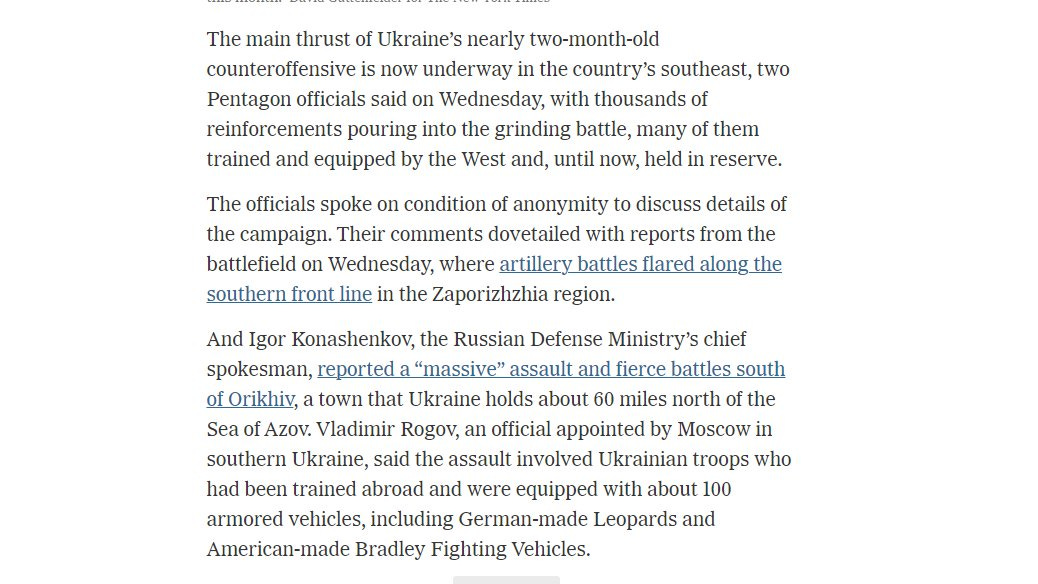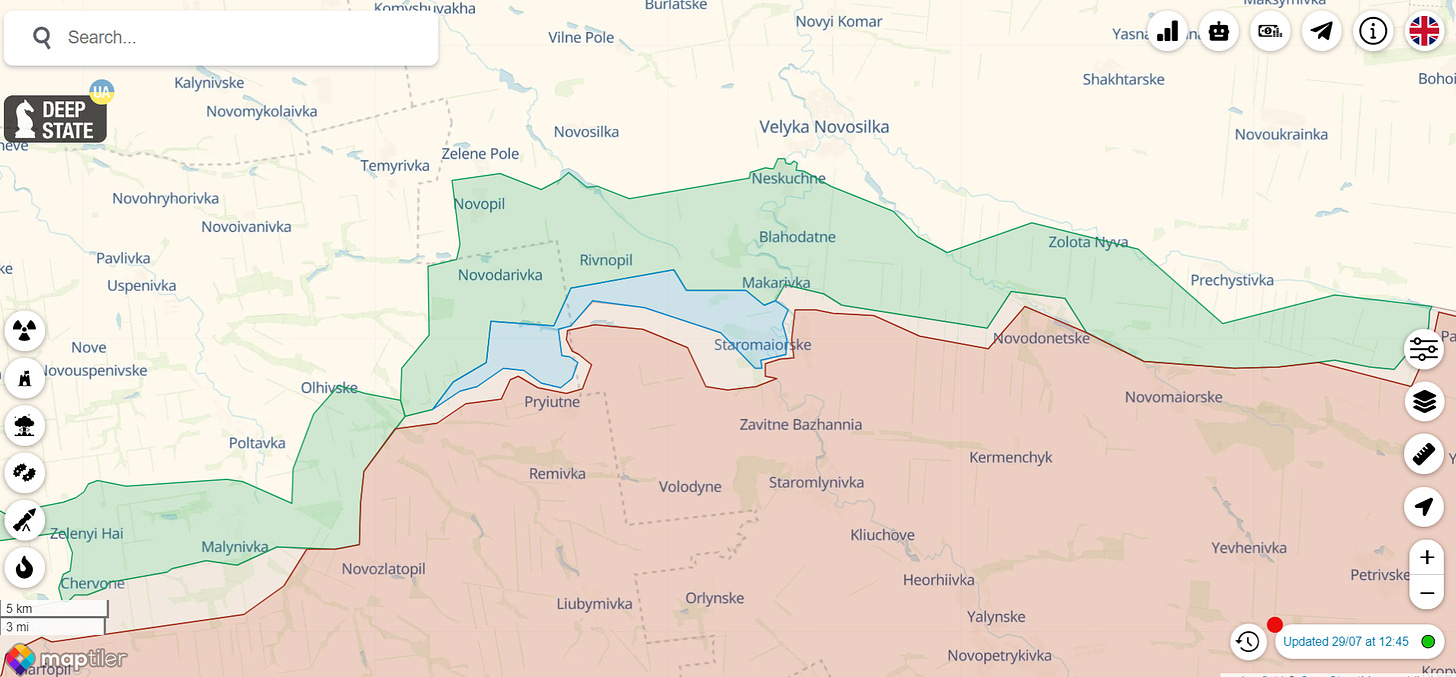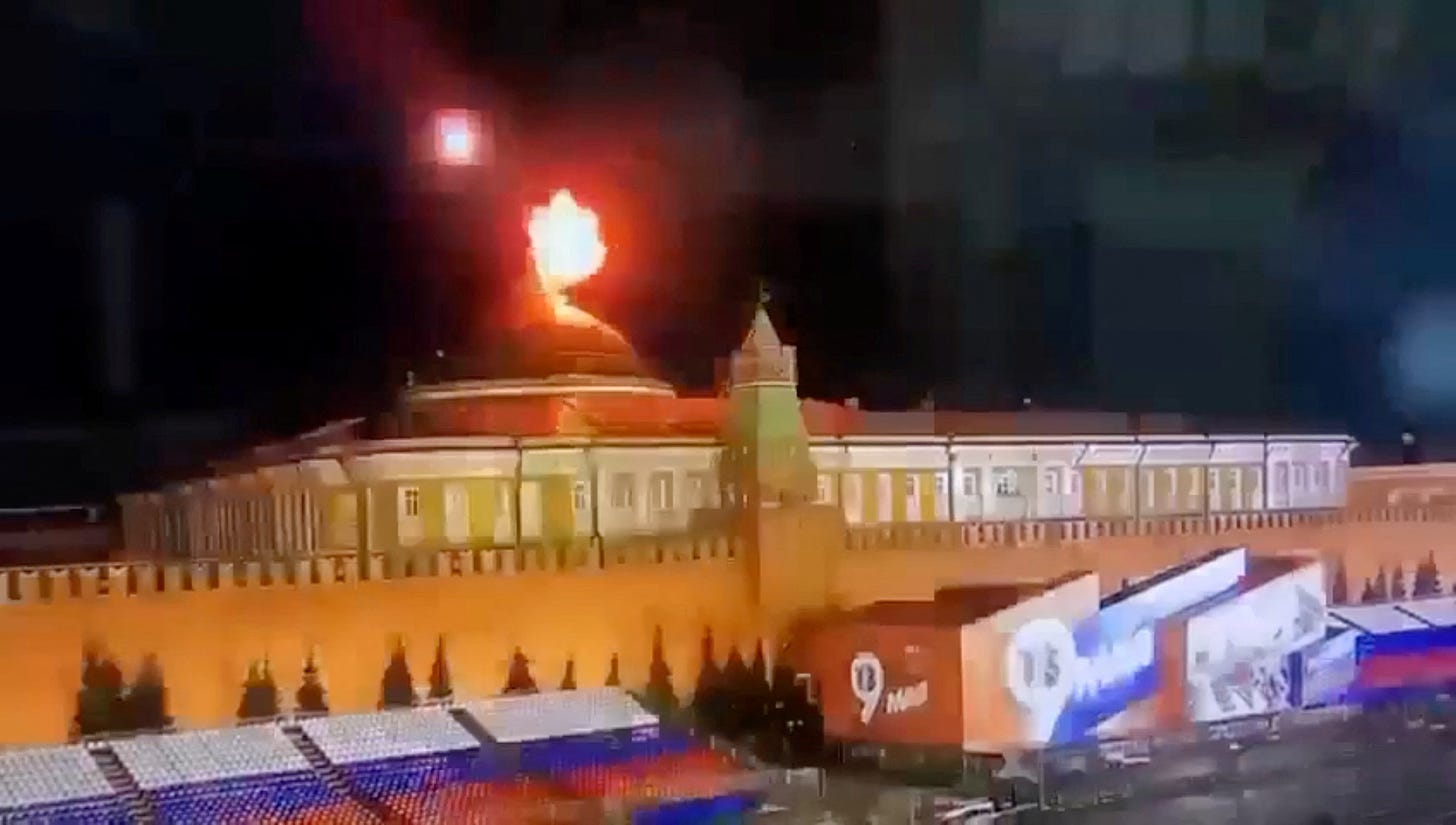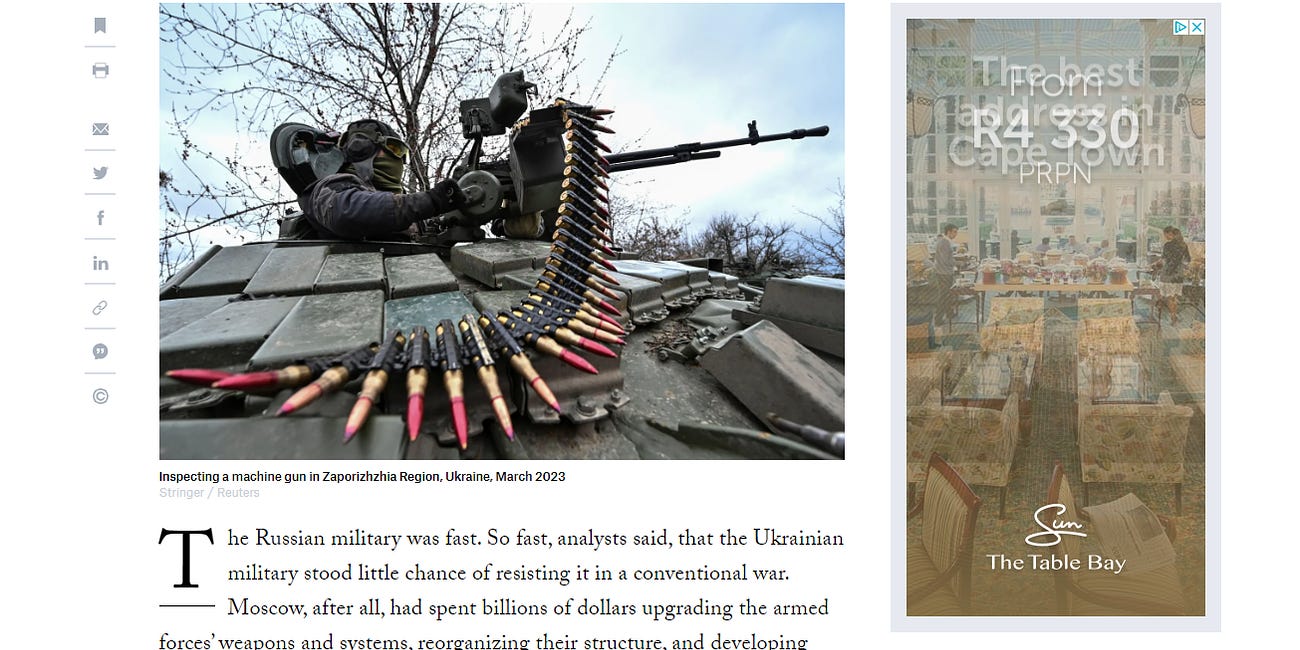For all the gains Ukrainians forces have achieved in the last week, they still have substantial numbers of top units in reserve.
This suggests that Ukraine's military leadership are still holding back in anticipation of a breach and breakout which those troops in reserve will then exploit. JL
Phillips O'Brien reports in his substack:
Early in the week, it became clear that Ukrainian forces had been making consistent advances. (But) we need to be cautious in that this represents the main effort. It could represent a small ramp up of the efforts over the last few weeks. A large force of reserves remains to be committed. Ukraine is not under any immediate time pressure to step up ground attacks, and they will only do so if they feel there is a weak spot in the line. Ukraine continues to making major efforts doing what it has been doing for weeks, trying to damage Russian artillery resources, from the systems to the logistics. They are still trying to weaken Russian defensive capabilities before going forward in masse.Good Morning Everyone. Even though there were alot of quite dramatic headlines over the week about the Ukrainian counteroffensive (first very pessimistic and then rather bubbly), and some claims that the Ukrainians were committing their reserves, I do wonder if indeed what we really say was a modest uptick in effort as the Ukrainians are actually continuing on their campaign of the last 5 weeks. Also, this morning there were pictures of (what we assume to be) Ukrainian drones attacking Moscow. This campaign is an interesting one, and I think I have an idea why they are doing it. Finally, I had an article out in Foreign Affairs, which discussed the importance of resetting our understanding of what matters in war. Its been extremely widely read, but some seem to resent it. The importance of the piece, as I will hopefully make clear, is not to simply cast blame on failure, its to push a new understanding so such mistakes are not made in the future.
Counteroffensive Update (don't assume this is the main effort)
A week ago there were, once again, some very pessimistic stories about the Ukrainian counteroffensive. They stressed the slow geographic progress of Ukrainian forces, Ukrainian losses, etc etc. You can find them if you want. However, early in the week, the narrative shifted quite markedly. It became clear that Ukrainian forces had been making consistent (if modest) advances.
Maybe the immediate catalyst for this was a CNN report of July 26, quoting unnamed Pentagon officials who said that Ukraine was committing more forces to the counteroffensive and may have identified weak points in the Russian line. You can read that report here if you want.
https://edition.cnn.com/europe/live-news/russia-ukraine-war-news-07-26-23#h_5a637916a55861db6e5fc0e39875caec
At that point, stories started coming on of some Ukrainian advances in Zaporizhzhia oblast. One of the issues seems to have been that there had been some Ukrainian advances, but the quiet (and bad weather) had made difficult to track them. The New York Times added to the news by saying that the ‘main’ effort of the counteroffensive might have commenced.
Then things really took off. President Zelensky certainly fanned the flames with his deliberately coy statement on July 26 that some ‘very good news’ was coming in from the offensive.
https://www.president.gov.ua/en/news/duzhe-vazhlivo-sho-zuhvalist-ciyeyi-ataki-rosijskih-terorist-84521
The specifics of the good news was made clear a few hours later when it was stated that the small town of Staromaiorske had been liberated. This had been a town the Ukrainians had been aiming at for a while (see Deep State map)
There were even these videos—which Zelensky tweeted out with the rather stirring caption.
Our South! Our guys! Glory to Ukraine!
https://twitter.com/ZelenskyyUa/status/1684627441610891265?s=20
And since then—once again things seem to have quieted down. We hear only little of new Ukrainian advances (which Im sure means that pessimistic stories will start up again soon). I do think we need to be very cautious in thinking that this development represents anything like the main effort of the Ukrainians. It could just as easily represent a small ramp up of the efforts of the Ukrainians over the last few weeks—and again it has not yet been confirmed how many of the brigades Ukraine has in reserve (which is considerable) have been committed to battle. I have heard from some pretty reliable people that a very large force of reserves still remains to be committed. I will go back to what I said last week—Ukraine is actually not under any immediate time pressure to step up ground attacks, and they will only do so if they really feel there is a weak spot in the line.
Actually, Ukraine continues to making major efforts doing what it has been doing for weeks—trying to damage Russian artillery resources, from the systems to the logistics. They are clearly still trying to weaken Russian defensive capabilities before going forward in masse. The data seems to show that clearly.
https://twitter.com/HerrDr8/status/1685274926415028225?s=20
Also the logistics campaign continues apace. The Ukrainians are going after connections to and from Crimea, and seem to have damaged railway and road connections.
https://twitter.com/HerrDr8/status/1685274926415028225?s=20
Before leaving the counteroffensive, I wanted to highlight a story by Michael Weiss and Jimmy Rushton, in case you missed it. Its a powerful refutation to the idea that the counteroffensive should be a failure—by looking at Russian sources. What they show, is an extremely high level concern in Russian circles at what the Ukrainians are doing and how Russian forces are weakening. Its a very different picture that many have given. Btw, both Michael and Jimmy deserve your attention regularly, they are two of the absolute best reporters on the war. In this case, their story is entitled: The Russians See Ukrainian Progress Where Others Do Not. Its really worth a close read.
https://newlinesmag.com/argument/russians-see-ukrainian-progress-where-others-dont/
Drones attack Moscow-why?
You may have woken up this morning to reports of Ukrainian UAVs attacking Moscow buildings.
https://twitter.com/Euan_MacDonald/status/1685553125900304384?s=20
Now the Ukrainan attacks on Moscow began months ago, as it seems very very likely that it was the Ukrainians who were responsible for the UAV attack on the Kremlin in early May.
On the one hand these attacks seem very un-Ukrainian. They are of very limited military value. Its hard to see how they would effect the ability of the Russians to wage war. When they May attack first occurred, I doubted that the Ukrainian did it for precisely that reason. I didn’t see how it helped them win the war.
I think now I (might) have a little idea of what they are thinking. The Ukrainians do seem convinced that the stability of the Russian state is weak. The Prigozhin mutiny probably turbocharged that belief. What they are probably thinking is that this will be extremely embarrassing for Putin—who cant even protect his capital from attack. Its a political campaign aimed at weakening Russian beliefs in the effectiveness of their own state and (the hope I guess) is that this will lead to the collapse of the Putinist state. When I was in Ukraine, it was regularly stated that they believed the Putinist state could implode—and it seems that they are trying to accelerate the process.
That is the only way this campaign makes sense (to me at least).
Why its matters that analysis was flawed--its about the future
I published the second article in Foreign Affairs this week arguing that we need to reassess how we understand power and war in light of the Russo-Ukraine war. This one was directed at how war was understood. The reception has been very positive. Its the most read piece in Foreign Affairs, and seems to be sparking a great deal of discussion. The article was entitled, The War that Defied Expectations.
https://www.foreignaffairs.com/ukraine/war-defied-expectations
Needless to say not everyone was happy. There have been some complaints that I should not be concerned with the great mistakes of the analysis of pre Feb 24, 2022 Russian and Ukrainian military power—and the shape of the war they would fight. The argument seems to be—everyone makes mistakes, so lets move on.
I think this is extremely wrong headed, because the mistakes were so profound, we must learn from them—so that this is not repeated in the future, when the results could be even more disastrous. Ultimately we need to study the analysis and learn from it for 3 main reasons.
If the expert community so drastically misunderstood what it was looking at, that calls into question the whole way the community operates. Its not good enough to say—everyone makes mistakes, lets move on. These are supposedly expert communities, that brief policy makers, are quoted widely in the news, and help set the public agenda. Its needs to be questioned and interrogated when it makes such major mistakes.
The impact of those mistakes did not magically end on Feb 25, 2022. The vision given of Russian and Ukrainian power, and how war would be fought had for a long time (and in many ways still does) influence the kinds of aid Ukraine has been given. Even today there remains a large chorus of those saying Russia cant lose, and therefore Ukraine should be forced to take a bad deal.
The most important issue—similar mistakes going forward could have even more catastrophic results. As the article hopefully made clear, war was presented as fast and to a large degree straightforward. Russia was said to have the capacity to achieve its goals and devastate the Ukrainian armed forces in relativel short order. This is almost never the case—war is rarely decisive and is frankly normally a catastrophic mess. Any war in Asia-Pacific is likely to be this on steroids. We need to talk about such a war in a far more sophisticated and realistic way. I went into that in more detail in this post.
Final point on this piece. There have been some queries on the quotes in the piece. All I can say is the Foreign Affairs fact checks and approves all quotes to the highest possible standard. They work extremely hard and we discussed the entire article in detail. All the quotes were approved and I stand by them unreservedly.
























0 comments:
Post a Comment